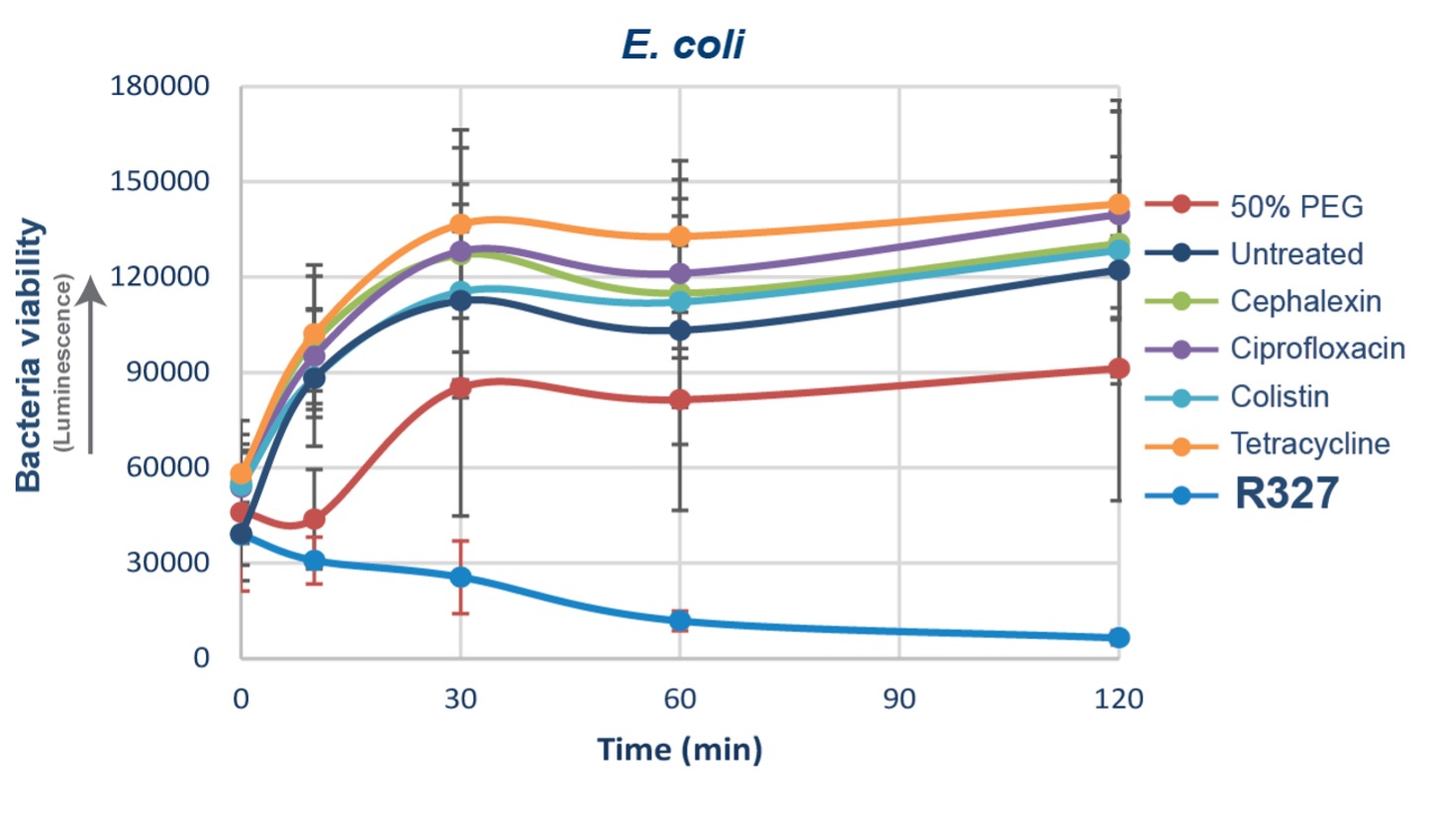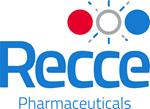Recce Pharmaceuticals Ltd today announced positive data from a Phase I/II trial for urinary tract infections (UTIs) and urosepsis, demonstrating that its lead candidate, RECCE® 327 (R327), administered intravenously is safe and efficacious against Escherichia coli (E. coli).
- Results demonstrate efficacy on bacterial growth in participants injected with RECCE® 327 (R327) at the highest tested dose of 4,000mg
- No serious adverse events and clinically significant changes observed, reinforcing safety profile of R327
- The study determined an optimal dosing regimen for R327 intravenously, showing rapid onset and sustained impact on Escherichia coli via an ATP mechanism in the urine of dosed participants
- Recce on track to initiate Phase II trial of R327 in patients with urinary tract infections in H2 2024
SYDNEY, July 01, 2024 (GLOBE NEWSWIRE) -- Recce Pharmaceuticals Ltd (ASX: RCE, FSE: R9Q) (the Company), the Company developing a new class of synthetic anti-infectives, today announced positive data from a Phase I/II trial for urinary tract infections (UTIs) and urosepsis, demonstrating that its lead candidate, RECCE® 327 (R327), administered intravenously is safe and efficacious against Escherichia coli (E. coli).
“The positive outcomes from this clinical trial provide more evidence of R327 as rapid-acting for the treatment of serious and life-threatening bacterial infections,” said Alan Dunton, MD, Chief Medical Advisor at Recce Pharmaceuticals. “The ability of R327 to disrupt bacterial energy production so effectively and sustain its activity over several hours highlights its potential as a transformative treatment for serious and/or resistant bacterial infections, including complicated UTIs/. The mechanism is novel as an antibacterial, which has been proven safe in humans. We are excited to further explore these findings and advance R327 through subsequent trial phases.”
Marc Sharp, Ph.D., Chief Scientific Officer of Linnaeus Bioscience, added, “The ability of R327 to achieve biologically relevant concentrations and exhibit anti-bacterial activity in urine samples is highly encouraging.”
The Phase I/II study included 25 healthy participants who received R327 at doses up to 4,000mg as intravenous infusions over various infusion times (15, 20, 30, and 45 minutes). The highest dose cohort included six participants, all receiving 4,000mg of R327 over a 20-minute infusion period.
Key findings from the trial at the highest dose, 4,000mg, of R327:
Consistent efficacy across participants: Most participants demonstrated significant R327 activity in their urine samples, particularly in the first hour post-dose. The concentrations achieved were sufficient to impact bacterial growth, indicating that R327 accumulates effectively in the urinary tract.
Clear impact on bacterial growth build-up over time in urine: In the most recent 4,000mg cohort, the study evaluated urine samples from six participants, with 10 urine samples per participant taken over a 6-hour period. Each urine sample was then tested ex vivo for its ability to impact the growth of E. coli, measured by an increase or decrease in luminescence. All six participants demonstrated a reduction in the rate of bacterial growth over time, with peak efficacy most often achieved 2 to 4 hours post-infusion.
Sustained effectiveness: The trial data revealed that R327's effect on bacterial growth was sustained over time, with significant activity noted not only within the initial 0 to 45-minute window but also extending up to 2 to 4 hours post-dosing. This extended period of activity suggests that R327 maintains its efficacy for prolonged durations, potentially enhancing its therapeutic value in clinical settings.
Rapid reduction in bacteria: In a previous study assessing the time it takes R327 to kill E. coli bacteria, R327 was shown to work faster than any other antibiotic to date, measured in minutes – not hours. This is an important feature of R327 and suggests the compound may be able to provide rapid relief to patients.

The Phase I/II trial met all its primary endpoints, demonstrating the compound's tolerability and significant antibacterial efficacy. Building on these promising results, the Company plans to commence a Phase II trial in patients with UTIs to further validate these findings and explore additional therapeutic indications for R327. The Phase II study is expected to be across 30 patients with the aim to confirm the efficacious potential of R327 among more diverse populations, ensuring robust and comprehensive data to support its clinical development.
Additionally, Recce is investigating the potential of R327 in treating a broader range of bacterial infections beyond UTIs and urosepsis, such as acute bacterial skin and skin structure infections (ABSSSI), with the goal of addressing the urgent global health threat posed by antibiotic-resistant pathogens.
About Recce Pharmaceuticals Ltd
Recce Pharmaceuticals Ltd (ASX: RCE, FSE: R9Q) is developing a New Class of Synthetic Anti-Infectives designed to address the urgent global health problems of antibiotic-resistant superbugs and emerging viral pathogens.
Recce’s anti-infective pipeline includes three patented, broad-spectrum, synthetic polymer anti-infectives: RECCE® 327 (R327) as an intravenous and topical therapy that is being developed for the treatment of serious and potentially life-threatening infections due to Gram-positive and Gram-negative bacteria, including their superbug forms; RECCE® 435 (R435) as an orally administered therapy for bacterial infections; and RECCE® 529 (R529) for viral infections. Through their multi-layered mechanisms of action, Recce’s anti-infectives have the potential to overcome the processes utilised by bacteria and viruses to overcome resistance – a current challenge facing existing antibiotics.
The World Health Organization (WHO) added R327, R435, and R529 to its list of antibacterial products in clinical development for priority pathogens, recognising Recce’s efforts to combat antimicrobial resistance. The FDA granted R327 Qualified Infectious Disease Product designation under the Generating Antibiotic Initiatives Now (GAIN) Act, providing Fast Track Designation and 10 years of market exclusivity post approval. R327 is also included on The Pew Charitable Trusts’ Global New Antibiotics in Development Pipeline as the sole synthetic polymer and sepsis drug candidate in development.
Recce wholly owns its automated manufacturing, supporting current clinical trials. Recce’s anti-infective pipeline aims to address synergistic, unmet medical needs by leveraging its unique technologies.
Corporate Contact
James Graham
Recce Pharmaceuticals Ltd
+61 (02) 9256 2571
James.graham@recce.com.au
Media & Investor Relations (AU)
Andrew Geddes
CityPR
+61 (02) 9267 4511
ageddes@citypublicrelations.com.au
Media (USA)
Michael Fitzhugh
LifeSci Communications
mfitzhugh@lifescicomms.com
Investor Relations (USA & EU)
Guillame van Renterghem
LifeSci Advisors
gvanrenterghem@lifesciadvisors.com
A graph accompanying this announcement is available at https://www.globenewswire.com/NewsRoom/AttachmentNg/d5748750-8ecb-4380-8691-6152af291bb1







